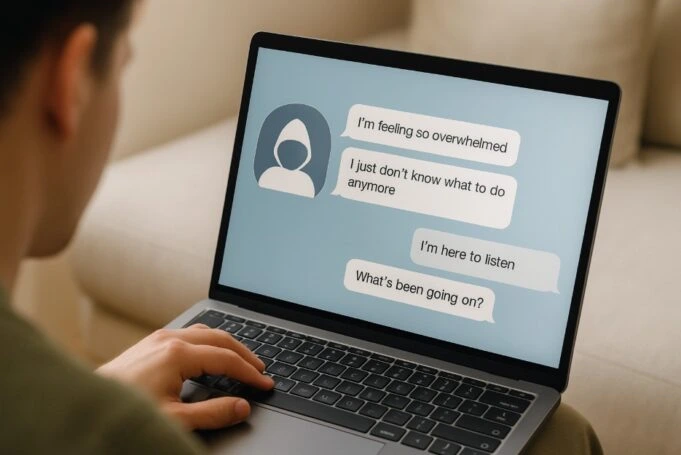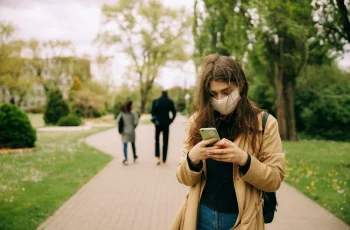As society becomes increasingly connected through digital platforms, mental health support is evolving to meet people where they are—online. One of the most promising innovations in this space is the rise of anonymous online chats for mental health. These platforms are reshaping how individuals seek help, offering safe, judgment-free environments for people to express themselves openly and without fear of stigma.
Whether it’s late-night anxiety or the need to speak without revealing personal identity, anonymous mental health support is helping countless individuals take the first, often difficult step toward healing. In this article, we’ll explore how these digital platforms are transforming emotional wellness, overcoming stigma, ensuring safety, and fostering community.

Breaking the Silence: Anonymity as a Tool for Openness
Stigma remains one of the most persistent barriers to seeking help for mental health issues. Fear of being judged or misunderstood discourages many from reaching out. Anonymous online chats offer a powerful solution by providing a confidential space where users can share thoughts, fears, or emotional struggles without revealing their identity.
This layer of anonymity empowers users to:
- Speak honestly about their emotions
- Explore difficult topics without self-censorship
- Connect with others facing similar mental health challenges
The result is a safe, non-judgmental space that encourages emotional vulnerability and often serves as a gateway to further mental health services, including therapy, counseling, and professional interventions. For many, these chats are the first time they’ve felt heard—without fear or shame.
Ensuring Safety and Upholding Privacy in Digital Mental Health Spaces
Trust is the foundation of any mental health support platform, and this is especially true in anonymous online environments. To maintain credibility and foster user safety, these services must adopt robust privacy protocols and security infrastructure.
Key safety measures often include:
- End-to-end encryption for message confidentiality
- Strict data protection policies
- No storage of identifying personal information
- 24/7 moderation to detect and intervene in harmful situations
Additionally, trained moderators are commonly present in mental health chat platforms. These individuals are educated in crisis intervention, active listening, and de-escalation techniques, ensuring a protective framework for all participants.
Users are also provided with educational materials about responsible sharing, emotional boundaries, and when to seek professional help. Together, these measures create a trustworthy and empowering digital space for mental health exploration.
From Isolation to Connection: Online Communities as a Lifeline
Many individuals struggling with mental health feel disconnected, isolated, and invisible. Anonymous chatrooms help bridge that emotional gap by fostering community and connection. When people realize that others are navigating similar challenges, it can dramatically reduce the sense of loneliness and validate their experiences.
These platforms provide:
- Round-the-clock availability for support during crisis or sleepless nights
- Peer-to-peer interaction for shared empathy
- Access to trained moderators or counselors to guide and support discussions
The flexibility and constant access of anonymous mental health chats are especially vital for individuals in remote areas, those with limited mobility, or anyone hesitant to seek in-person services. It’s support on your terms, when and how you need it most.
Real-World Impact: Examples of Mental Health Platforms in Action
Several online platforms are leading the way in creating secure, anonymous, and compassionate environments for mental health support. Many have built strong reputations by implementing:
- Mental health screening tools
- Chat features with licensed professionals
- Group discussion forums for niche topics (e.g., anxiety, LGBTQ+ support, grief)
These resources are often integrated into apps and websites that prioritize mental health education, accessibility, and customized support pathways—giving users control over their mental wellness journey.
Future Prospects: Technology and the Next Wave of Mental Health Innovation
As the field of digital mental health support grows, so too does its potential. Artificial intelligence, machine learning, and virtual reality are being explored as ways to enhance real-time emotional support, provide immersive therapy experiences, and predict mental health patterns before crises occur.
Expect to see:
- Tailored mental health support based on user behavior and preferences
- Demographic-specific chatrooms catering to teens, veterans, or new parents
- Integration with wearables and biometric data for holistic mental wellness
The shift toward normalizing mental health care is also gaining momentum. As these platforms become more visible and trusted, seeking help is becoming a more accepted part of overall health and self-care routines.

Final Thoughts: A New Era of Accessible, Confidential Mental Health Support
The rise of anonymous online chats marks a pivotal shift in the way we approach mental health. By removing traditional barriers like stigma, cost, and geographic access, these digital platforms create opportunities for everyone—regardless of background—to seek meaningful emotional support.
They don’t replace therapy, but they do complement it, offering a critical first step for many who are struggling. As we continue to embrace digital solutions for mental well-being, anonymous chat platforms are proving to be more than just a trend—they’re a lifeline, helping individuals transform isolation into connection and fear into empowerment.

